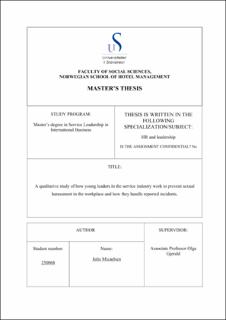A qualitative study of how young leaders in the service industry work to prevent sexual harassment in the workplace and how they handle reported incidents.
Master thesis
Permanent lenke
https://hdl.handle.net/11250/3085698Utgivelsesdato
2023Metadata
Vis full innførselSamlinger
- Studentoppgaver (SV-NHS) [618]
Sammendrag
Leaders play a crucial role in preventing sexual harassment in the workplace. Their commitment and efforts are essential in creating a safe and healthy work environment. Young leadership can result in challenges based on the need for more knowledge and better judgment calls. However, young leaders can also contribute to changing attitudes, providing new perspectives, and establishing clear guidelines to combat sexual harassment. This master's thesis investigates how young leaders, specifically from the fitness and nightlife industries, are working to prevent sexual harassment from happening in the workplace. A part of the research also includes how young leaders deal with situations related to sexual harassment if a case arises.
Sexual harassment is a prevalent issue that can severely impact employees and organizations. However, there is a lack of research on how young leaders address this problem. A qualitative research study has been carried out by collecting eight in-depth interviews, allowing for a rich and precise understanding of their perspectives to help answer the research question. The study sample comprised young leaders aged 24-31 working in the mentioned sectors. The study explores young leaders' experiences, strategies, and challenges in preventing sexual harassment. Findings shed light on how the leaders included in the study are working proactively with sexual harassment, such as implementing policies, conducting training with employees, and promoting a safe and healthy working culture. The research also highlights the need for prevention work regarding sexual harassment and sheds light on the leaders' ability to know their position and how they deal with reported incidents. This includes their response mechanism, support for victims, and attitude related to this topic.
By exploring the aspect of young leaders from the service industries, moreover, their experience and practices related to sexual harassment, this thesis contributes to a deeper understanding of their role in preventing sexual harassment. Furthermore, the study explores how young leaders should take this matter seriously, encourage open communication, and establish a safe workplace culture with a zero-tolerant policy against sexual harassment.
